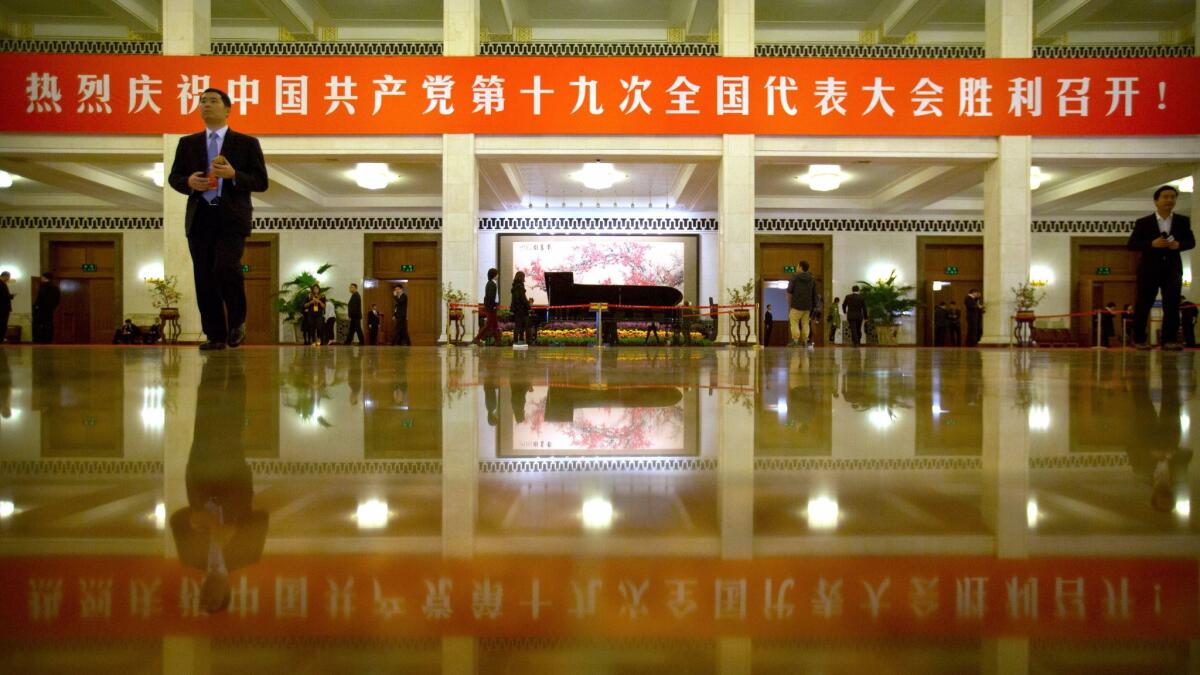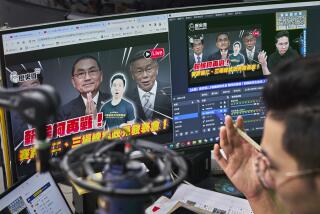Op-Ed: After years of reporting in China, I’m still maddeningly ignorant about the Communist Party

One time the veil fell for me. I was visiting Henan, a Chinese province with all the charm of a New Jersey and the educational competencies of an Arkansas. At a restaurant, a drunk man outfitted like a mid-level Chinese Communist Party official — zippered jacket, black leather shoes, a man-purse — approached my table, complimented my Chinese, and asked me how I liked his province. I lied and told him it was very nice. He beamed with approval and staggered away. When I called for the check, the waiter informed me that the drunk man had paid for it.
Outside, his wife propped him up. “Hey!” he slurred. “I paid for your meal. I work for the tax bureau. I’m the boss here. They at this restaurant have to be nice to me or I’ll shut them down.” I, and the Party — not the rules, or slogans or statements — we are what matters, he seemed to say. His wife, mortified, interrupted with the usual banalities. “Welcome to Henan,” she said. “China has 5,000 years of history, and Henan has several important historic sites. I hope you enjoy your visit to China.”
The memory stuck because the wife’s sanitized description of her province, vague and historic, competed in real time with the husband’s grimy — and probably honest — description of his Party’s present-day corruption. Usually, I only get the sanitized version.
Many Chinese scab over festering wounds inflicted by the Chinese Communist Party’s policies with niceties about economic development and cultural sites.
Since I began visiting this country in 2001, I’ve found that many Chinese scab over festering wounds inflicted by the Party’s policies with niceties about economic development and cultural sites, canned complaints about traffic and pollution, or patronizing queries about my language ability and whether I can use chopsticks.
At one conference in Europe several years ago, I met the Party secretary of Guangzhou, an important Chinese city. “Your Chinese is so good,” he replied dismissively, after I asked him a relatively innocuous question about U.S.-China relations. “How did you like studying in China?”
I remain maddeningly ignorant about the most important issues: What’s happening inside the higher levels of the Party? How do Chinese citizens feel about Party rule in general, and Communist Party Secretary Xi Jinping in particular?
Tuesday was the last day of the Party Congress, the quinquennial event where the Party announces important personnel changes and policy priorities. On Wednesday, five to nine men will demonstrate their status as the most powerful people in China by walking across the Congress stage. In the Chinese style, the men will clap while the audience claps at them. They will likely be in their 50s and 60s, with dyed black hair, and conservative, dark suits. Xi will almost certainly walk out first, as the party’s top official.
While we know a wealth of biographical details about these men, we know little about their policy preferences, and even less about their personalities or, perhaps most important, their intrapersonal relations. How does Xi get along with the other members of the Politburo Standing Committee, that five-to-nine-member body that rules China? We don’t know.
“China’s Party-state is extremely successful at controlling information,” Jessica Batke and Oliver Melton, a former and current State Department analyst respectively, wrote in a recent essay for ChinaFile. “Even the most basic insights into policy deliberations and processes, leaders’ intentions and views, and elite power dynamics are filtered through a sophisticated propaganda and censorship regime.”
How can one learn more? Good contacts help. One Western journalist I know uses his wife’s network; her father is an important Party official. But such access is obviously hard to come by.
I don’t mean to perpetuate old ideas of the unknowable Orient — tired tropes about the inscrutable Chinese. But it’s important to recognize that the Party, especially at the top, remains awfully opaque. For that reason, most of us have to settle for knowing what we don’t know.
On a bus ride from a hotel to a conference some time ago, I noticed the son of a former Chinese premier sitting by himself. I sat next to him, and for the roughly 30-minute ride, he excitedly asked me questions about how I felt about China and how I learned Chinese and, if memory serves, whether I could use chopsticks. I peppered him with questions about Chinese politics. He was pleasant, and unfailingly polite. I learned about his experience studying in the West and his desire for peace and harmony. I learned nothing about the Party.
Isaac Stone Fish is a senior fellow at the Asia Society’s Center on U.S.-China Relations, on sabbatical from Foreign Policy Magazine.
Follow the Opinion section on Twitter @latimesopinion or Facebook.
More to Read
A cure for the common opinion
Get thought-provoking perspectives with our weekly newsletter.
You may occasionally receive promotional content from the Los Angeles Times.





